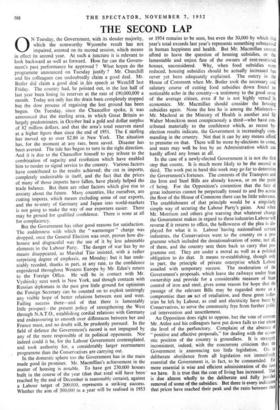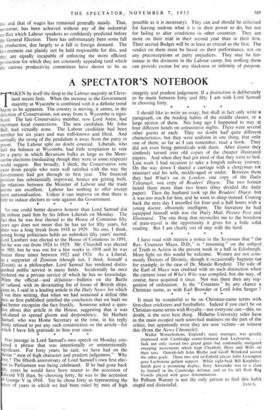THE SECOND LAP
0 N Tuesday, the Government, with its slender majority, which the noteworthy Wycombe result has not impaired, entered on its second session, which means in effect its second year. At such a juncture it is relevant to look backward as well as forward. How far can the Govern- ment's past performance be approved ? What hopes do the programme announced on Tuesday justify ? Mr. Churchill and his colleagues can undoubtedly claim a good deal. Mr.
Butler did claim a good deal in his speech at Westcliff last Friday. The country had, he pointed out, in the last half of last year been losing its reserves at the rate of £90,000,000 a month. Today not only has the drain been completely stopped but the slow process of regaining the lost ground has been begun. On Tuesday, since the Chancellor spoke, it was announced that the sterling area, in which Great Britain so largely predominates, in October had a gold and dollar surplus of 82 million dollars, and that the area's total reserves stand at a higher figure than since the end of 1951. The £ sterling has moved up to over $2.80 in New York. The situation has, for the moment at any rate, been saved. Disaster has been averted. The tide has begun to turn in the right direction. And it is due to the Chancellor himself to pay tribute to the combination of sagacity and resolution which have enabled him to render, so signal service to the country. Various factors have contributed to the results achieved; the cut in imports, completely undesirable in itself, and the fact that the prices of many of those imports have fallen, have plainly helped the trade balance. But there are other factors which give rise to anxiety about the future. Many countries, like ourselves, are cutting imports, which means excluding some of our exports, and the re-entry of Germany and Japan into world-markets is not going to make the way of our exporters easier. There may be ground for qualified confidence. There is none at all for complacency.
But the Government has other good reasons for satisfaction. The suddenness with which the " warmonger " charge was dropped, once the General Election was over, proves how dis- honest and disgraceful was the use of it by less admirable elements in the Labour Party. The danger of war has by no means disappeared, as Marshal Tito insisted, with a rather surprising degree of emphasis, on Monday; but it has unde- niably receded, thanks in part, at any rate, to the confidence engendered throughout Western Europe by Mr. Eden's return to the Foreign Office. He will be in contact with Mr. Vyshinsky next week in New York, and though contacts with Russian diplomats in the past give little ground for optimism the Foreign Secretary can be counted on to exploit untiringly any visible hope of better relations between east and west. Failing success there—and of that there is lamentably little prospect—the present policy of strengthening the West through N.A.T.O., establishing cordial relations with Germany and endeavouring to smooth over differences between her and France must, and no doubt will,* prudently pursued. In the field of defence the Government's record is not impugned by any of the more responsible of its political opponents. Nor indeed could it be, for the Labour Government contemplated, and took authority for, a considerably larger rearmament programme than the Conservatives are carrying out.
In the domestic sphere too the Government has in the main made good its promises. Mr. Macmillan's achievement in the matter of housing is notable. To have got 230,000 houses built in the course of the year (that that total will have been reached by the end of December is reasonably certain), against a Labour target of 200,000, represents a striking success. Whether the aim of 300,000 in a year will be realised in 1953 or 1954 remains to be seen, but even the 30,000 by which this year's total exceeds last year's represents something substantial in human happiness and health. But Mr. Macmillan cannot afford to leave the question of housing subsidies, or the lamentable and unjust fate of the owners of rent-restricted houses, unconsidered. Why, when food subsidies were reduced, housing subsidies should be actually increased has never yet been adequately explained. The outcry in the House of Commom when Mr. Butler took the necessary and salutary course of- cutting food subsidies down found no noticeable echo in the country—a testimony to the good sense of the average citizen, even if he is not highly versed in economics. Mr. Macmillan should consider the housing sub es again. None the l sshe is amongheMinistereMr. Macleod at the Ministry of Health is another and SiSit Walter onekt0omostopeousyathirdwhove con- tributed materially to the confidence which, as recent by. election results indicate, the Government is increasingly cont., manding in the country. Not that it can by any means afford' to presume on that. There will be more by-elections to come, and seats may well be lost by an Administration which can hardly afford any losses at all.
In the case of a newly-elected Government it is not the first step that counts. It is much more likely to be the second or third. The work put in hand this week may go far to determine the Government's fortunes. The contents of the Transport and the Iron and Steel Bills are already known, or on the point cf being. For the Opposition's contention that the fate of great industries cannot be perpetually tossed to and fro across the floor of the House of Commons there can be little tolerance. The establishment of that principle would be a singularly simple way of securing the Labour Party's gains. And when Mr. Morrison and others give warning that whatever change the Government makes in regard to these industries Labour will reverse if it returns to office, the hollowness of the plea is dis- played for what it is. Labour having nationalised certain industries, the Conservatives went to the country on a pro. gramme which included the denationalisation of some, not all, of them, and the country sent them back to carry that pro. gramme out. They are under a moral as well as a political obligation to do that. It means re-establishing, though only in part, the principle of private enterprise which Labour assailed with temporary success. The moderation of the Government's proposals, which leave the railways under State ownership and provide for a considerable measure of State control of iron and steel, gives some reason for hope that the passage of the relevant Bills may be regarded more as a compromise than an -act of retaliation, and these great indus- tries be left by Labour, as coal and electricity have been by Conservatives, to serve the community free from further politi- cal intervention and unsettlement.
_ An Opposition does right to oppose, but the vote of censure Mr. Attlee and his colleagues have put down fails to rise above the level of the perfunctory. - -Complaint of the absence of " positive and effective proposals," for dealing with the econa mic position of the country is groundless. It is strangely inconsistent, indeed, with the concurrent criticism that the Government is announcing too little legislation. On itt deliberate absdence from all legislation not immediately essential the GoVernment is, in fact, to be commended. Fat, more essential is wise and efficient administration of the laws we have. It is true that the cost of living has increased. That is due almost wholly to the deliberate and fully justified . removal of some of the subsidies. But there is every indicat that prices have reached their peak and the ratio between the rise and that of wages has remained generally steady. That, moreover, has been achieved without any of the industrial conflict which Labour speakers so confidently predicted before the General Election. There has unfortunately been some fall in production, due largely to a fall in foreign demand. The Government can plainly not be held responsible for this, and they are equally incapable of enforcing the more efficient production for which they are constantly appealing (and which the various productivity committees have shown to be as possible as it is necessary). They can and should be criticised for leaving undone what it is in their power to do, but not for failing to alter conditions in other countries. They are more on their trial in their second year than in their first. Their second Budget will be at least as crucial as the first. The verdict on them must be based on their performance, not on any preconceptions or party prejudices. They may be for- tunate in the divisions in the Labour camp, but nothing there can provide excuse for any slackness or infirmity of purpose.



































 Previous page
Previous page